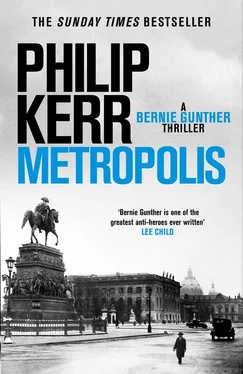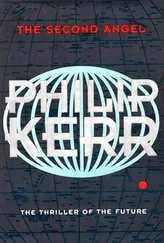Outside the Nussbaum were the sheep; well, one anyway. Miczek and the other policeman had arrested the man who was now my number one suspect; straightaway I recognized him from Dora Hauptmann’s description. Both cops had drawn their batons and looked ready to deal with a man resisting arrest, even one who looked as tough as this fellow.
‘He came out just as soon as you started your spiel,’ said Miczek. ‘In a hurry, too. Like maybe he didn’t want to help the Berlin police.’
‘You Kube?’ I asked.
‘Nope.’
‘Kolbe, then?’
The big man shrugged. ‘Who wants to know?’
He stank of beer and was sufficiently unsteady on his feet to persuade me that he’d been drinking all afternoon.
‘I’ve heard you were paid to watch Bruno Kleiber’s back.’
‘Who told you that?’
‘Doesn’t matter. Just answer the question.’
‘You’ve got the wrong Fritz, copper. I played the Jew’s numbers just like lots of people around here, but I was never his dog.’
‘You’ve got something against Jews?’
‘Hasn’t everyone?’
‘It didn’t sound like it in there,’ I said. ‘Besides, who would be dumb enough to admit he didn’t like Jews when there’s a dead one lying on the quayside just five minutes’ walk from here?’
‘I don’t like Jews. What of it?’
‘Gives you a motive to kill him, I’d have thought. That and a hundred-mark float that was in the dead man’s back pocket. Which is reason enough for me to search you.’
‘Try it and see what happens, copper.’
‘Search him.’
Kolbe raised his huge fist, which was as far as it got before Miczek tapped him on the back of the head with his police baton; not hard, but just hard enough to drop him onto the cobbles, leaving him dazed for several minutes, in no position to resist us. We went through his pockets and just about the first thing we found was a solid-gold signet ring; on this was a Star of David.
‘For a man who doesn’t like Jews you have some interesting jewellery,’ I said.
Miczek had a good-quality leather wallet open on his palm and anyone could have seen it wasn’t Kolbe’s; for one thing there was a wedding picture of Kleiber and his wife; for another, the wallet held two hundred-mark notes. We even found an empty leather sheath for the murder weapon in Kolbe’s pocket. It was probably the easiest murder arrest I ever made, but I was soon to discover that not all Berlin’s murderers were as dumb as Herbert Kolbe.
We went back to the Alex to put Kolbe in the lock-up. As usual the main front door was so heavy I had to push it open with both hands — Gross was carrying the camera, and the two men in uniform each held one of Kolbe’s muscular arms. The door closed behind us with an enormous hollow boom like the sound of a howitzer at the Last Judgement. Inside the entrance hall everything was as busy as the front line during wartime: drunks being processed for a night in the cells, typewriters clattering away, telephones ringing, coppers shouting, keys jangling, women crying, police dogs barking, and always the front door closing loudly on the peculiar metropolitan hell that was the Berlin Police Praesidium. Leaving the boys in green to process our prisoner I grabbed a quick coffee and a smoke in the canteen and then went up to the Commission offices to file my report. But on the stairs, I met none other than Kurt Reichenbach. There was an awkward silence between us for a moment, and then Reichenbach lifted his hat politely.
‘I’ve just heard that you got the seat in the murder wagon,’ he said affably. ‘Congratulations, my dear fellow. It’s a good break for you. And very well deserved.’
‘Thanks. That’s good of you, Kurt.’
‘Not at all. Word is you’ll go far, Gunther. You’ll be a commissar in no time. Me, I’ve got a big mouth so it’s probably just as well I didn’t get the seat. Truth be told, two Jews in the one car is one Jew too many. But you know when to keep your lip buttoned, lad. That’s the secret to advancement around here. Knowing when to keep your trap shut. And when to forget about politics. Besides, there are too many damn lawyers in the force already. The ranks of the commissars are stiff with them. You’re precisely the kind of new blood this place needs.’
Reichenbach was small and bearded, with an easy smile. He wore a fine black leather coat in nearly all weathers and carried a thick walking stick. Since there was nothing wrong with either of his legs it was assumed, rightly, that he carried the stick in lieu of a truncheon.
He was well dressed for a detective. There was a feather in the band of his grey bowler hat and a handsome gold pin in the knot of his green woollen tie. Even when it was empty, the amber cigar holder he favoured rarely left his mouth, but on this occasion it was filled with a sweet-smelling Dominican Aurora. I was sure about the brand because even as he was speaking he was generously tucking one into the breast pocket of my jacket.
‘Anyway, there’s something for you. A good cigar to celebrate your promotion and show there’s no hard feelings from me. I get these sent from a special shop in Amsterdam.’
‘Thanks, Kurt. They must be expensive.’
‘Sure they’re expensive. But there’s no wisdom in smoking cheap cigars, is there?’
I was almost sure this was a reference to Bernhard Weiss, but if it was he didn’t make a big thing of it and I didn’t pick him up on it.
‘My wife, who’s a nurse, disapproves of all kinds of smoking, but where would Kripo be without tobacco? That’s what I say. It’s hard enough being a detective as it is without giving up something that stimulates the old grey machine.’ He tapped his head and grinned. ‘I suppose if I ever stopped to think about it, I might give it up. But until then I shall keep puffing away. In spite of my wife.’
I ran the cigar under my nose, savouring it gratefully and quietly wondering where he got the money for such luxuries. I was quite sure I’d seen his leather coat in the window at Peek & Cloppenburg costing over a thousand reichsmarks. I’d heard it said he had a loan-sharking business on the side; then again, that might just have been plain anti-Semitism; he certainly never offered me a loan. Still, it’s true that being a detective with the Prussian police wasn’t particularly well paid.
‘By the way, Gunther, there’s a favour you might do me if you’re so inclined.’
‘Sure. If I can.’
‘I have a friend who’s a film-maker. Her name is Thea von Harbou and she’s a scriptwriter who’s married to Fritz Lang, the film director.’ He paused. ‘I take it you’ve heard of Fritz Lang.’
‘I’ve heard of Fritz Lang.’
‘Thea writes his film scripts. She’s researching a new movie about a sex murderer and would dearly like to speak to someone who’s employed by the famous Berlin Murder Commission.’
‘Look, I’ve only just started. I’m not sure what I can tell her that you couldn’t tell her. It’s not like you haven’t worked for the Commission.’
‘True, but I’m not a permanent member. And not actively on a murder case right now. Which is an important distinction. To her, anyway. Also, she has ambitions of being able to speak to the Big Buddha, and the plain fact of the matter is that there’s bad blood between Gennat and me, as is now obvious to everyone. Gennat would certainly have refused if I’d asked him about Thea von Harbou. He thinks I’m a thug. Well, maybe I am. I try to carry out my duties as best I can, but sometimes I am a little overzealous; particularly where Nazis are concerned. Either way, I can’t help Thea in this particular respect and I was hoping you might speak with her. Look, all she really cares about is that the person she meets is a permanent member of Berlin’s famous Commission. I imagine so she can tell her husband as much. He’s a very demanding fellow, by all accounts.’
Читать дальше












